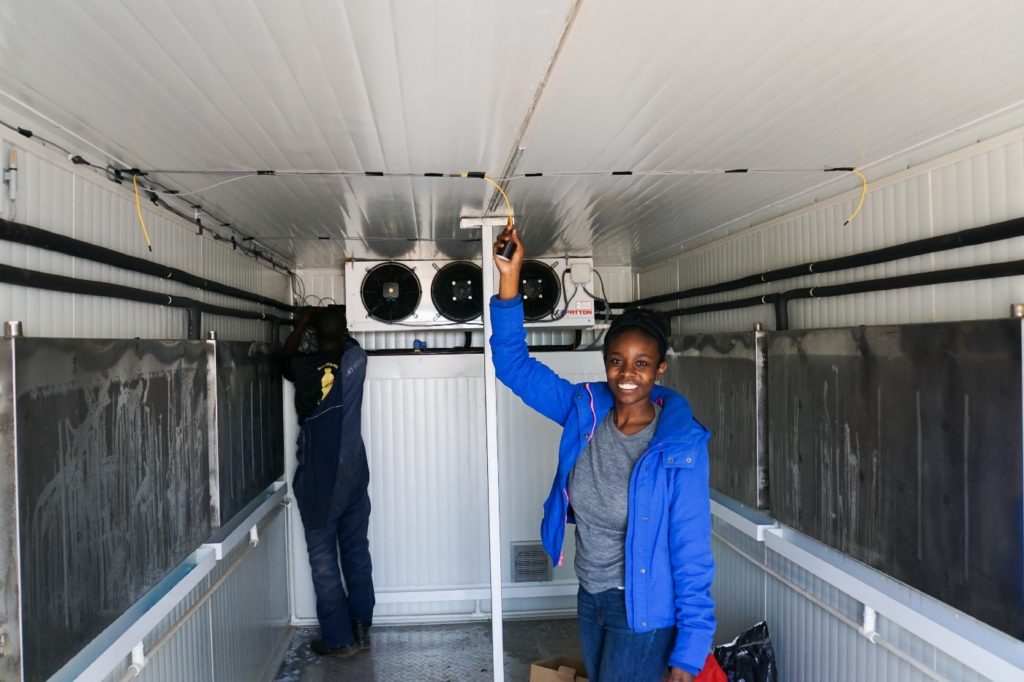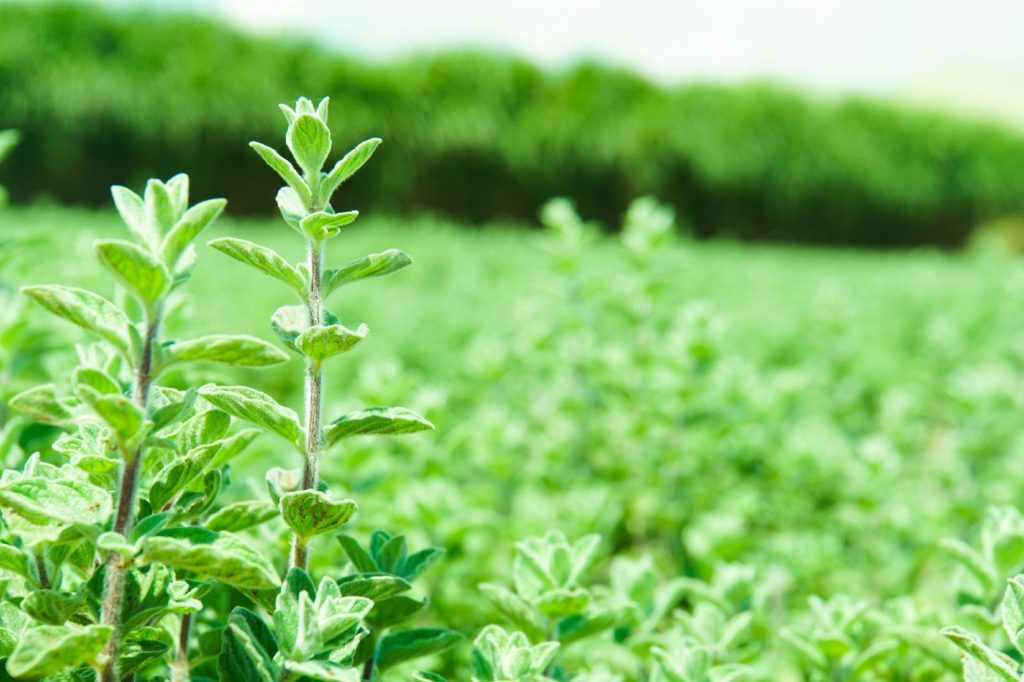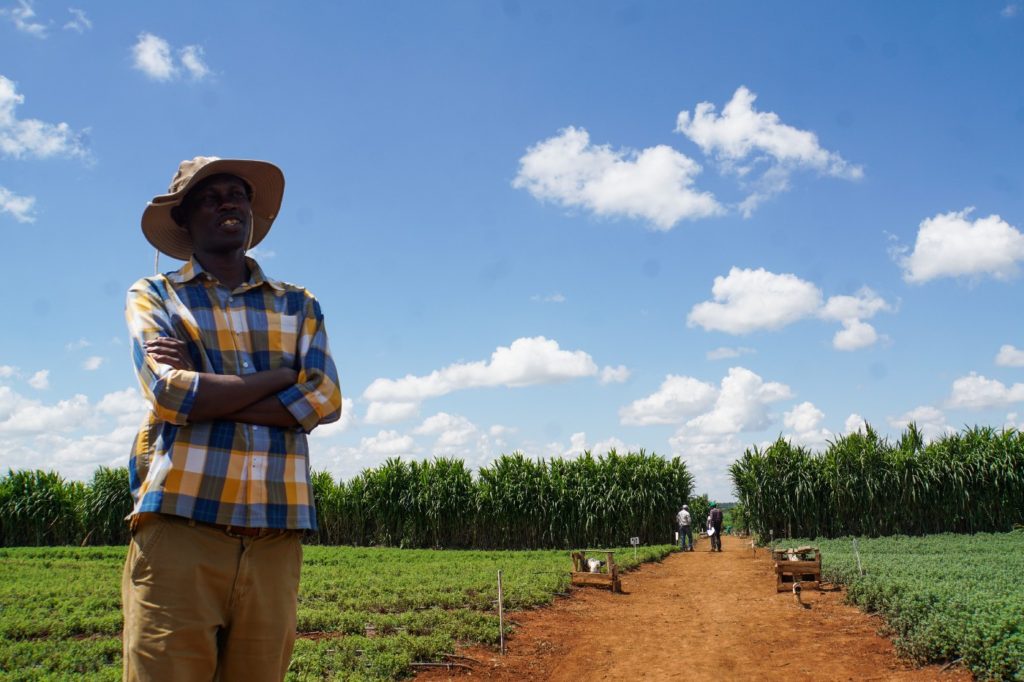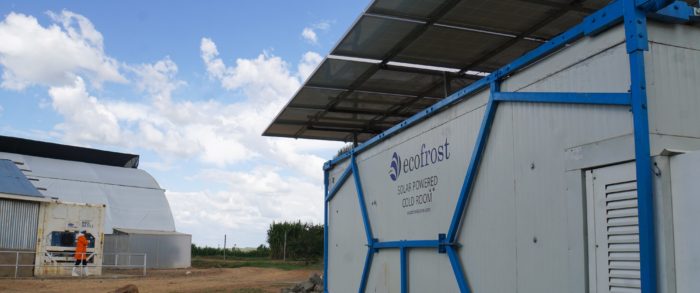Article originally published by Efficiency for Access
By Hannah Blair, Communications Associate at CLASP, Efficiency for Access Co-Secretariat
Blue Sky Herbs, part of Kubali Limited, may be less than a year old, but no other farm in Laikipia County, Kenya can boast of hosting an advanced solar cold room unit. In the midst of lush and aromatic herb farmlands, the stark white ecofrost cold storage unit with sparkling new solar panels is hard to miss.
Although it is not the first off-grid cold storage unit on the continent, ecofrost is the first ecozen cold unit to make the journey to sub-Saharan Africa from the company’s headquarters in Maharashtra state, India. ecofrost is a portable, solar powered cold room with storage capacity of 5 metric tons. The unit works with efficient thermal energy storage and can reserve up to 30 hours of energy.
ecozen is one of the finalists participating in the CLASP-managed Global LEAP Awards Off-Grid Cold Chain Challenge (OGCCC). The OGCCC is an international competition to identify and promote the most energy-efficient, sustainable and cost-effective technologies that can meet cold room storage requirements for fresh fruits, vegetables, and dairy products in Kenya, Nigeria, Rwanda, Tanzania, and Uganda. This October, innovation prizes will be awarded to the top three product winners to stimulate advances in cold chain technology markets.

The Efficiency for Access team traveled to Laikipia to meet the Blue Sky Herbs team, learn more about their unique challenges accessing reliable cold chain options, and install a remote monitoring system to evaluate the performance of the unit. The monitoring system evaluates various aspects of performance, including humidity, ambient and internal temperatures, solar energy production and consumption.
Like many of the other competitors operating in this final round of the OGCCC, ecozen faced extensive challenges transporting the unit across the Kenyan border. After spending more than four months with customs and border control in Mombasa, the unit finally arrived at Blue Sky Herbs in time for the biggest basil harvest of the year.
“We invested in importing this unit all the way from India because we could not find a better solution closer to home,” explained Kariuki. “We heard good things about the ecofrost — it was developed for very hot farming climates so we thought it would be a good fit for our environment.”
Prior to purchasing the unit, Kariuki estimated that the farm spent close to Ksh. 500,000 ($5,000 USD) on energy costs each month. Blue Sky Herbs relies on a grid connection, but frequent power outages leave the farm reliant on generators to power the facilities 2–3 days per week for up to eight hours a day. The farm currently operates two large cold rooms that require power 24 hours a day. However, temperatures within the cold rooms are inconsistent. Blue Sky has incurred significant losses due to temperatures within the rooms dropping too low at night and freezing the delicate herbs.

The farm currently produces eleven different types of herbs, each with their own specifications for harvest and storage temperature. Basil, the intended crop for ecofrost, must cool slowly and be stored at 10–12 degrees Celsius. In the previous harvest, basil was stored in a pack house, but temperatures were too high.
“By the time the basil reached our customers in Europe, it was wilted and bad. We ended up losing 34% of basil from that harvest season. It was very disappointing,” says Maurice Ngigi, Project Manager at Blue Sky Herbs.
With plans to expand production to meet the demands of the export market, Blue Sky Herbs hopes to increase its usage of renewable energy sources. If the ecozen unit proves to be a reliable and cost-effective alternative to grid power, the farm will invest in additional off-grid agricultural technologies, such as solar water pumps.

“We expect this unit will solve a lot of our problems. It is green, reliable, efficient, cost-effective, and will have less breakdowns than our other cold rooms,” Kariuki explained as he gleamed in the direction of the long awaited ecofrost unit. “We waited a long time and we are very glad it is here at last.”
The Global LEAP Off-Grid Cold Chain Challenge is a joint initiative with Energy 4 Impact, with the support of the Ideas to Impact programme, which is funded by the UK Department for International Development, and Power Africa’s Beyond the Grid Initiative. This October, innovation prizes will be awarded to the top three product winners to stimulate advances in cold chain technology markets.
Edit:
We bagged the 2nd place in the Off-Grid Cold Chain Challenge!
ecozen’s unit was identified as having high technical performance, a short repayment period and incorporated sophisticated Internet of Things that was greatly appreciated by the farm user.
Of the 10 finalists selected to move on to stage 2, six were able to set up their cold storage units on location. Of these, only four could put their cold units to productive use.
An expert panel of four judges selected a 1st, 2nd and 3rd place solutions. The judges’ selections and the corresponding prize amounts awarded to each company are as follows:
- 1st Place – ColdHubs – £75,000
- 2nd Place – ecozen – £50,000
- 3rd Place – FreshBox – £25,000
- Runner Up – Ecolife
Each of the four judges that participated have strong technical backgrounds in off-grid solar and cooling value chains.




